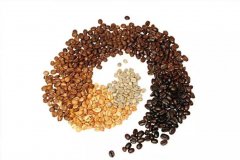Have you ever had authentic Taiwanese coffee? "Why is it so hard to buy" truth exposure

For professional baristas, please follow the coffee workshop (Wechat official account cafe_style)
Drinking coffee has become a trend in recent years. From convenience stores and chain coffee shops to coffee shops in the alley, coffee can be bought everywhere. Coffee consumed by ordinary people can be divided into black coffee, Italian coffee and individual coffee. The well-known Blue Mountain Coffee, Yejiaxuefei, Mantenin and so on are the famous single-item coffee.
There are many kinds of coffee trees in the world, mainly distributed in the tropics and subtropics. The mainstream coffee trees are Arabica and Robusta, the former accounts for about 70% of the global output, and the flavor of coffee varies greatly due to factors such as producing area, altitude and so on.
Global coffee can be divided into four regions according to its flavor characteristics. Coffee produced in Central America tastes fruity and sour, South American coffee shows an intermediate flavor that is unwilling to be sour, and African coffee makes people feel wild. As for Asian coffee, it tastes bitter, but the aroma is strong.
Coffee is also produced in Taiwan.
Taiwan is located in the subtropics, and its geographical location is just suitable for coffee growth. as early as the 19th century, Deji Foreign Company introduced Arabica coffee to Taiwan. During the Japanese occupation, a lot of coffee was grown in the south-central mountains of Taiwan, and it was even sent to Japan for the emperor to drink.
However, after the 1950s, coffee in Taiwan was no longer valued. Although the Agricultural Test Institute put into coffee research after retrocession, and even introduced new varieties to the United States, it could not change the fact that the coffee industry was shrinking.
At present, the planting area of coffee in Taiwan is about 800 to 1000 hectares, and the county and city with the largest production is Pingtung County. As the trend of drinking coffee has become more and more popular in recent years, small farmers have gradually put into coffee planting and production, but the output is still very rare.
Why is it so difficult to buy Taiwanese coffee?
When you enter the coffee shop, you can see that the merchants offer coffee from Brazil, Kenya, Colombia and other countries, but it is difficult to enjoy a cup of Taiwanese coffee in the coffee shop. Weng Shihao, an assistant researcher in the fish pond branch of the Tea Industry improvement Farm, points out that the cost of growing coffee in Taiwan is relatively high, and it costs about NT $1200 to NT $1500 to buy a pound of Taiwanese coffee directly from small farmers. The price of Yega Xuefei boutique beans on the market is about NT $600 to NT $1500 per pound.
During the field visit, there are coffee shops that bake their own beans, and the shop owners say that Taiwan's coffee is delicious and of high quality, but because the output is scarce, the price of the basic cup is about 200 to 300 yuan per cup. If the price of the award-winning coffee is even higher, most of the shops who enter Taiwan beans are targeting foreign tourists as the main customer group.
In the past, it has been reported that there is a problem of mixed beans in Taiwan coffee. Weng Shihao says that at present, most coffee in Taiwan is sold by coffee farmers themselves, so the problem of mixed beans is relatively rare. If consumers cannot find coffee farmers to buy, they can buy it through production and marketing classes or farmers' associations. For example, Guoxian Township in Nantou County promotes coffee origin certification, so that consumers can identify the origin of coffee.
Over the years, Taiwan has continued to hold evaluation competitions for domestic boutique coffee beans. Due to the scarcity of Taiwan's coffee production, it is unable to meet the export standards, but through the competition, the public can know that Taiwan has the ability to produce fine coffee.
This year, the Yunlin County government sponsored the "Evaluation of Taiwan's domestic Fine Coffee beans in 106 years". 116 Taiwan's domestic boutique coffee beans from various coffee producing areas across the country participated in the competition, which were divided into traditional washing groups and other treatment groups for the competition.
Important Notice :
前街咖啡 FrontStreet Coffee has moved to new addredd:
FrontStreet Coffee Address: 315,Donghua East Road,GuangZhou
Tel:020 38364473
- Prev

Beginner! Choose the coffee flavor you like
The exchange of professional baristas please follow the coffee workshop (Wechat official account cafe_style) about coffee beans, the varieties, producing areas and manor coffee flavors produced by countries around the world are different, each has its own characteristics. If you are a beginner who is new to coffee, or who has not yet tasted what you like, you may want to refer to the following simple and easy-to-understand analysis data.
- Next

Yang Yishan will compete for the championship in the World siphon Coffee Competition in Kaohsiung.
For the exchange of professional baristas, please follow the Coffee Workshop (Wechat official account cafe_style). The first "World Cup siphon Coffee Competition" held in Taiwan will take place on the 28th. Yang Yishan (left), representing Taiwan, used to make coffee on a blank sheet of paper. After years of self-study, she won the second World Cup in 2015. (mentioned by Viewpoint Communications
Related
- What is the difference between Indonesian Sumatra Mantinin coffee and gold Mantinin? How to distinguish between real and fake golden Mantelin coffee?
- What does bypass mean in coffee? Why can hand-brewed coffee and water make it better?
- Unexpected! Ruixing Telunsu lattes use a smoothie machine to foam milk?!
- % Arabia's first store in Henan opens into the village?! Netizen: Thought it was P's
- Does an authentic standard mocha coffee recipe use chocolate sauce or powder? Mocha Latte/Dirty Coffee/Salty Mocha Coffee Recipe Share!
- What is the difference between Vietnam egg coffee and Norway egg coffee? Hand-brewed single product coffee filter paper filter cloth filter flat solution!
- What is the difference between sun-cured and honey-treated coffee? What are the differences in the flavor characteristics of sun-honey coffee?
- How to make Italian latte! How much milk does a standard latte use/what should the ratio of coffee to milk be?
- How to make butter American/butter latte/butter Dirty coffee? Is hand-brewed coffee good with butter?
- Is Dirty the cold version of Australian White? What is the difference between dirty coffee/decent coffee and Australian white espresso?

